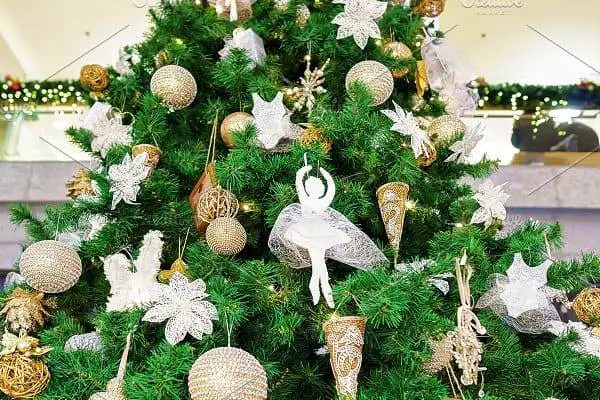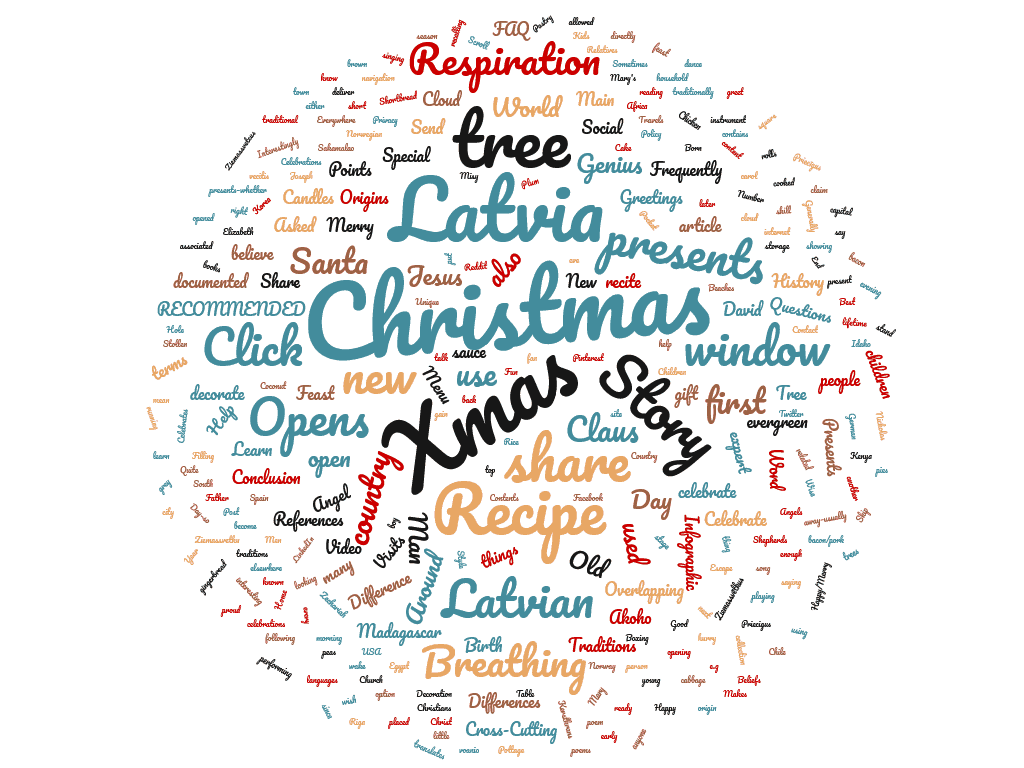Latvian Santa Claus
Santa Claus, is also known as Ziemassvetku vecitis to Latvian children, which directly translates to the “Christmas Old Man”.
Children believe in this “Christmas Old Man” and every morning on Christmas Day, they wake up to presents under their Christmas tree, that he put under their tree.
Christmas Presents in Latvia
Interestingly enough, Christmas presents are traditionally opened either Christmas eve, in the evening, or early Christmas Day–so the “Christmas Old Man” has to hurry and deliver their presents!
Generally, these presents are placed under the tree when most of the household is away–when they are at Church or elsewhere.
There are many little traditions associated with opening presents. Sometimes, before being allowed to open your present, you have to stand next to the tree and recite a short poem.
During the Christmas season, many young children learn these poems to recite, so they are ready to open their presents!
They also have the option of showing off another skill to gain the right to open their presents–whether it is singing a Christmas carol or some other song, playing an instrument, or performing a Christmas dance.
Christmas Tree Origins in Latvia
The country of Latvia is also proud to claim their country as the origin of the very first country to use a tree to decorate for Christmas e.g. the Christmas tree.
The capital city of Riga, Latvia has the first documented use of a Christmas tree being used during Christmas and New Year celebrations in the town square.

They have been using an evergreen tree to decorate and celebrate since 1510.
Many people believe that Germany was the first country to use Christmas trees as decorations and to celebrate Christmas, particularly with the use of the evergreen tree, but it was actually first documented in Latvia.
Latvia Christmas Feast and Greetings
If you want to greet anyone by saying “Merry Christmas” in Latvian, say “Priecigus Ziemassvetcus”.
The traditional Latvian feast during Christmas contains brown or grey peas cooked with bacon/pork sauce, bacon rolls, cabbage with sauce, pies, and gingerbread to share.
In Latvian Happy/Merry Christmas is ‘Priecīgus Ziemassvētkus’. It is interesting to know how people wish Happy or Merry Christmas in other languages.
Learn More With the Help of Video
Main Points About Christmas in Latvia
- In Latvia, Christmas has a blend of Christian and pagan traditions.
- It is not allowed to eat meat on Christmas eve. There are 9 dishes on the menu which do not include any form of meat.
- Christmas trees are a big deal in Latvia. Latvians claim that their home is the home of Christmas trees. Hence, the Christmas tree is a symbol of unity.
- For Christmas dinner, there are traditionally 12 dishes. Some of them include meat, gray peas, barley, bacon, gingerbread cookies, and other delicious delicacies.
- The Christmas preparations begin with the Latvians tidying up their living spaces.
Conclusion
Latvians celebrate Christmas on the 25th but you might open presents on Christmas Eve or on Christmas Day, and you might have to say a poem by the tree to get it!.
There’s a special Christmas dish consisting of peas with pork sauce, bacon rolls, small pies, and gingerbread.
Gingerbread is a big tradition in Latvia and you can find them beautifully decorated all winter in markets and shops, probably in the summer as well.
Word Cloud for Christmas in Latvia
The following is a collection of the most used terms in this article on Christmas in Latvia. This should help in recalling related terms as used in this article at a later stage for you.

- https://comeniusimaginefuture.wordpress.com/2012/12/25/christmas-tradition-in-latvia/
- https://www.latvia.eu/traditions/traditional-festivities
- https://www.baltictimes.com/news/articles/27607/

The Latvian Christmas traditions have been so beautifully captured in this article, it’s truly enriching to learn about.
Indeed, the writer did a fantastic job presenting the unique traditions in Latvia.
It’s so interesting to see how much of the traditions are rooted in unity and togetherness, it really brings the spirit of Christmas alive.
Absolutely, it’s wonderful to see how these traditions bring people together.
I totally agree, the sense of community and shared traditions is heartwarming.
The word cloud and the references provided at the end add so much value to the article. They are great tools for deeper understanding.
I agree, it’s a great way to summarize and provide further reading.
Absolutely, they are very helpful and insightful.
I’m so impressed by how much effort children in Latvia put into learning poems and songs to open their presents. It’s such a unique and beautiful tradition.
Absolutely, Latvian Christmas traditions are truly special and an example of rich culture.
I agree, it’s fascinating to learn about the traditions of other cultures, especially around Christmas time.
Latvian Christmas traditions are so rich and diverse. The origins of the Christmas tree was a surprising fact for me and I’ve learned a lot from this article.
Yes, I had no idea the Christmas tree traditions had roots in Latvia. I feel more knowledgeable now.
I never knew Latvia had such unique Christmas traditions. The article has opened my eyes to so much.
It’s amazing to see how different cultures celebrate Christmas. Latvia’s traditions are truly fascinating.
It’s quite surprising to see the unique traditions around opening presents in Latvia, reciting poems or performing is such an intriguing concept.
Absolutely, it’s such a fascinating way to add personal touches to the tradition.
It’s certainly unique and adds an extra layer of excitement to receiving Christmas presents.
The Christmas traditions of Latvia are incredibly delightful to read about, and bring a sense of appreciation for the diversity in the world.
Absolutely, learning about the traditions of other cultures is so valuable and enriching.
I don’t think it’s right to include meat in the Christmas dinner, because it’s a tradition not to eat meat on Christmas eve. The article contradicts itself.
I think the traditions of 9 dishes without meat should have been highlighted more, it’s a significant part of Latvian Christmas.
That’s an interesting point and I share your thoughts. It’s important to represent the traditions accurately.
I found the origins of the Christmas tree in Latvia to be a fascinating revelation.